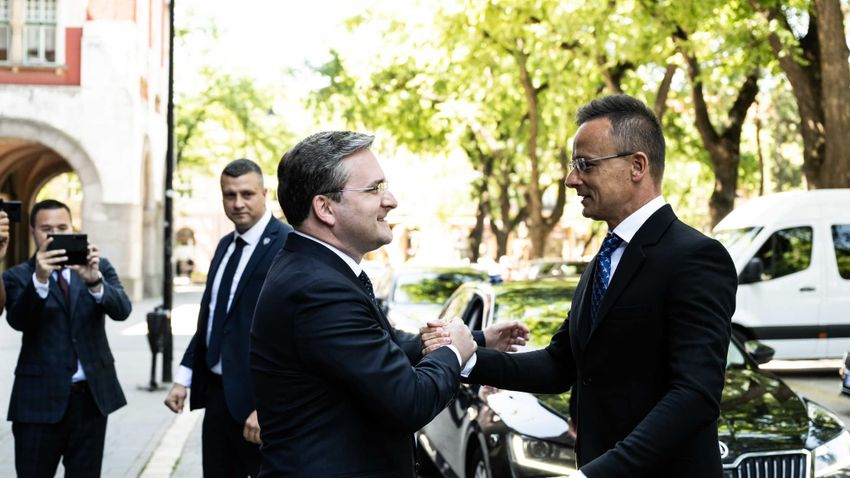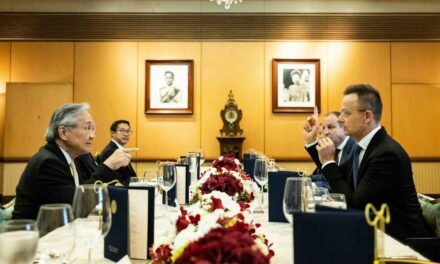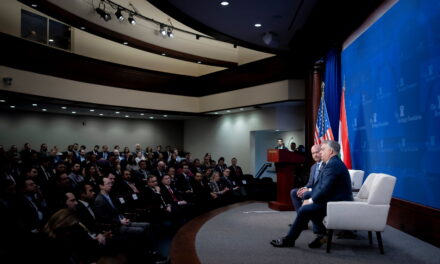Migration pressure has reached a new level of danger, migrants are becoming more and more aggressive and violent, they are already arming themselves and using these weapons, Péter Szijjártó emphasized on Monday in Subotica, where he met with his Serbian official colleague, Nikola Szelakovic. He emphasized that this meeting took place at a critical time, as "Europe is facing dramatic challenges". As he said: the war taking place in Hungary's neighborhood and the sanction responses to it are creating a permanent war-like inflationary environment.
In addition, the refugee crisis is intensifying and we have to face more and more serious migration challenges, moreover, we Hungarians - basically the only ones - face challenges from the south and the east at the same time, we are under double pressure, Péter Szijjártó underlined.
At the joint press conference, the Minister of Foreign Affairs and Trade drew attention to the fact that due to the increasing intensity of the war in Ukraine, the number of refugees on Hungary's eastern border is increasing, and more than ten thousand refugees are already arriving in the country every day, and their number has exceeded 820 thousand. "At the same time, the migration pressure is getting more and more serious. To date, we have stopped more than 110,000 illegal migrants at our southern border", pointed out Péter Szijjártó, who also pointed out that the increasingly violent and armed migrants pose a security threat to Serbia and Hungary as well. "It should be made clear that there is no human rights issue here," he emphasized.
I would like to make it clear that these people who attack our policemen, who behave aggressively here in Serbia, who shoot, these people have no right to enter the territory of Hungary, stated the Minister of Foreign Affairs and Trade.
The head of Hungarian diplomacy reminded that migrants come to Serbia through safe countries, by serially violating borders, that is, by serially committing crimes, and no one has the right to do that. According to Péter Szijjártó, the situation will become more and more serious because the war in Ukraine threatens many parts of the world with famine. "This food supply crisis will put new, probably much heavier migration pressure on both Serbs and Hungarians than ever before. Therefore, I believe that this is the second-to-last moment for Brussels and George Soros's NGOs to stop encouraging migration and organizing migration," the minister emphasized.
"We ask Brussels and the Soros NGOs not to encourage migrants, not to incite them to commit crimes, and not to incite them to violate the sovereignty of countries such as Serbia or Hungary," expressed Péter Szijjártó's position.
After explaining the challenges, the Minister of Foreign Affairs and Trade also pointed out that the cooperation between Serbs and Hungarians is a recent success story. He pointed out that the trade turnover between the two countries has increased "brutally", and in the first four months of this year, 117 percent more turnover was carried out than a year ago, and last year's full-year growth was also 42 percent. Péter Szijjártó also drew attention to the fact that "the biggest joint venture of all time, the modernization of the railway line connecting Belgrade with Budapest, has also reached the implementation phase in Hungary". Therefore, from the first of August, the section will be completely closed, and freight traffic will be redirected to the Szeged-Szabadka railway line, which has already been renovated in the last period. The agreement to this effect was signed by the two heads of ministries during Monday's meeting.
The minister also touched on energy supply issues and reminded that the two countries recently assured that "natural gas from Russia, which is critical for the security of the energy supply of both Serbia and Hungary and irreplaceable for the time being, can safely arrive in Serbia and Hungary".
At the press conference, Serbian Foreign Minister Nikola Szelakovics reminded that he is meeting his Hungarian counterpart for the ninth time in the last year and a half, which is proof of the good relations between the two countries. He thanked Serbian President Aleksandar Vucic and Prime Minister Viktor Orbán for laying the foundations for good relations between the two countries and the two peoples. The Serbian foreign minister thanked his Hungarian colleague that the Hungarian government encourages investors to look for investment opportunities in Serbia as well. He also thanked the Hungarian Prime Minister and the Minister of Foreign Affairs for their support of Serbia's European integration.
Source and full article: Magyar Nemzet
Featured Image: Facebook













